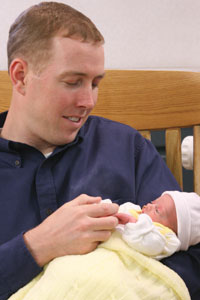Supplement made from breast milk helps give NICU babies a healthy start


Mother’s milk is the perfect food for babies, and Christiana Care is the only health system in the region to provide a highly concentrated supplement made from breast milk as a first treatment for the smallest newborns.
Since November, 75 babies in the neonatal intensive-care unit (NICU) have received Prolact+ H2MF, a fortified human milk product. Christiana Care has covered the entire cost of the supplement—more than $1 million—which is given to babies weighing 2.5 pounds or less to avoid complications associated with cow’s milk concentrates.
“It is a high-priced product, but a very high-value product,” says Deborah Tuttle, M.D., neonatologist and medical director of Christiana Care’s Mother’s Milk Bank. “We are mitigating problems by starting newborns on the human milk fortifier before they develop problems.”
Tiny babies need fortified milk to provide extra calories to help them grow. The overwhelming majority of health systems boost mother’s milk with a cow’s milk supplement. Children’s Hospital of Philadelphia offers Prolact+ H2MF only as a rescue treatment for newborns who cannot tolerate cow’s milk.
Because the protein in cow’s milk is a larger molecule than breast milk, it is more difficult for newborns to digest, says Fern Butler, RN, NICU nurse manager. That can cause issues such as bloating, watery stools, intestinal problems and, rarely, ruptured intestines.
Christiana Care began exploring Prolact+ H2MF as a treatment option two years ago with the goal of decreasing morbidity and reducing babies’ stay in the NICU. After a year of study, the health system committed to shouldering the supplement’s cost.
“It is the right thing to do, as well as a huge emotional satisfier for moms,” says Butler, who notes that the NICU will include the cost of Prolact+ H2MF in its budget for the next fiscal year. “It speaks to the mission of our organization that we are willing to take this leap,” she says.
Although it’s too soon to analyze the numbers, Butler says it is clear that newborns are tolerating Prolact+ H2MF better than cow’s milk.
Oldest milk bank in the United States
Christiana Care runs the nation’s longest continuously operating milk bank for patients, founded in 1948. In 2010, the milk bank processed 34,065 ounces of milk and an additional 13,779 ounces purchased from other milk banks, says Diane Fagan, RN, Mother’s Milk Bank coordinator.
“The milk bank team provides thousands of highly individualized feedings,” Dr. Tuttle says. “Human milk fortifier is yet another way in which the NICU is fulfilling its mission of providing the highest level of care.”